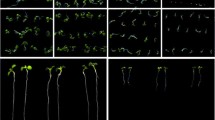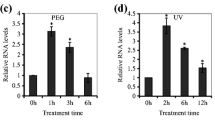Abstract
Lectin receptor-like kinases (LecRLK) are widespread in higher plants and their effects on abiotic stress tolerance are gradually being reported. However, little information is available on LecRLK functions in bryophytes. Here, an L-type LecRLK gene (PnLecRLK1) was characterized from the Antarctic moss Pohlia nutans. Subcellular localization analysis revealed that PnLecRLK1 was a plasma membrane protein. The expression of PnLecRLK1 was rapidly induced by simulated cold, salt, and drought stresses as well as by exogenously applied abscisic acid (ABA) and methyl jasmonate. Transgenic Arabidopsis plants of overexpressing PnLecRLK1 exhibited enhanced tolerance to chilling-stress and increased ABA sensitivity. Additionally, the expression levels of genes in the C-repeat binding factor (CBF) signaling pathway such as AtCBF1, AtCBF2, AtCBF3 and AtCOR47 were markedly increased in transgenic Arabidopsis. Furthermore, the expression levels of ABA-responsive genes, such as AtABI4, AtABI5, AtMYB2 and AtDREB2A, were also significantly up-regulated in transgenic Arabidopsis. Therefore, our results suggested that PnLecRLK1 functions as a membrane-bound regulator that increases chilling stress tolerance and ABA sensitivity to enable P. nutans to adapt to polar climates.



Similar content being viewed by others
References
Bhyan SB, Minami A, Kaneko Y, Suzuki S, Arakawa K, Sakata Y, Takezawa D (2012) Cold acclimation in the moss Physcomitrella patens involves abscisic acid-dependent signaling. J Plant Physiol 169:137–145
Biasini M, Bienert S, Waterhouse A, Arnold K, Studer G, Schmidt T, Kiefer F, Gallo Cassarino T, Bertoni M, Bordoli L, Schwede T (2014) SWISS-MODEL: modelling protein tertiary and quaternary structure using evolutionary information. Nucleic Acids Res 42:W252–W258
Bouwmeester K, Govers F (2009) Arabidopsis L-type lectin receptor kinases: phylogeny, classification, and expression profiles. J Exp Bot 60:4383–4396
Cheng X, Wu Y, Guo J, Du B, Chen R, Zhu L, He G (2013) A rice lectin receptor-like kinase that is involved in innate immune responses also contributes to seed germination. Plant J 76:687–698
Clarke LJ, Robinson SA (2008) Cell wall-bound ultraviolet-screening compounds explain the high ultraviolet tolerance of the Antarctic moss, Ceratodon purpureus. New Phytol 179:776–783
Convey P (2006) Antarctic terrestrial ecosystems: responses to environmental change. Polarforschung 75:101–111
Convey P, Stevens MI (2007) Antarctic biodiversity. Science 317:1877–1878
de Victoria FC, Pereira AB, da Costa DP (2009) Composition and distribution of moss formations in the ice-free areas adjoining the Arctowski region, Admiralty Bay, King George Island, Antarctica. IHERINGIA, Sér Bot 64:81–91
Deng K, Wang Q, Zeng J, Guo X, Zhao X, Tang D, Liu X (2009) A lectin receptor kinase positively regulates ABA response during seed germination and is involved in salt and osmotic stress response. J Plant Biol 52:493–500
Gao LL, Xue HW (2012) Global analysis of expression profiles of rice receptor-like kinase genes. Mol Plant 5:143–153
Huang P, Ju HW, Min JH, Zhang X, Kim SH, Yang KY, Kim CS (2013) Overexpression of L-type lectin-like protein kinase 1 confers pathogen resistance and regulates salinity response in Arabidopsis thaliana. Plant Sci 203–204:98–106
Huang PY, Yeh YH, Liu AC, Cheng CP, Zimmerli L (2014) The Arabidopsis LecRK-VI.2 associates with the pattern-recognition receptor FLS2 and primes Nicotiana benthamiana pattern-triggered immunity. Plant J 79:243–255
Kato K, Arikawa T, Imura S, Kanda H (2013) Molecular identification and phylogeny of an aquatic moss species in Antarctic lakes. Polar Biol 36:1557–1568
Kline KG, Sussman MR, Jones AM (2010) Abscisic acid receptors. Plant Physiol 154:479–482
Letunic I, Doerks T, Bork P (2009) SMART 6: recent updates and new developments. Nucleic Acids Res 37:D229–D232
Liu S, Wang N, Zhang P, Cong B, Lin X, Wang S, Xia G, Huang X (2013) Next-generation sequencing-based transcriptome profiling analysis of Pohlia nutans reveals insight into the stress-relevant genes in Antarctic moss. Extremophiles 17:391–403
Liu Y, Wu H, Chen H, Liu Y, He J, Kang H, Sun Z, Pan G, Wang Q, Hu J (2015) A gene cluster encoding lectin receptor kinases confers broad-spectrum and durable insect resistance in rice. Nat biotechnol 33:301–305
Livak KJ, Schmittgen TD (2001) Analysis of relative gene expression data using real-time quantitative PCR and the 2−∆∆CT Method. Methods 25:402–408
Osakabe Y, Maruyama K, Seki M, Satou M, Shinozaki K, Yamaguchi-Shinozaki K (2005) Leucine-rich repeat receptor-like kinase1 is a key membrane-bound regulator of abscisic acid early signaling in Arabidopsis. Plant Cell 17:1105–1119
Osakabe Y, Mizuno S, Tanaka H, Maruyama K, Osakabe K, Todaka D, Fujita Y, Kobayashi M, Shinozaki K, Yamaguchi-Shinozaki K (2010) Overproduction of the membrane-bound receptor-like protein kinase 1, RPK1, enhances abiotic stress tolerance in Arabidopsis. J Biol Chem 285:9190–9201
Pearce DA (2008) Climate change and the microbiology of the Antarctic Peninsula region. Sci Prog 91:203–217
Pressel S (2009) The illustrated moss flora of Antarctica. Ann Bot 104:6–7
Quatrano RS, McDaniel SF, Khandelwal A, Perroud PF, Cove DJ (2007) Physcomitrella patens: mosses enter the genomic age. Curr Opin Plant Biol 10:182–189
Rautenberger R, Wiencke C, Bischof K (2013) Acclimation to UV radiation and antioxidative defence in the endemic Antarctic brown macroalga Desmarestia anceps along a depth gradient. Polar Biol 36:1779–1789
Richardt S, Timmerhaus G, Lang D, Qudeimat E, Correa LG, Reski R, Rensing SA, Frank W (2010) Microarray analysis of the moss Physcomitrella patens reveals evolutionarily conserved transcriptional regulation of salt stress and abscisic acid signalling. Plant Mol Biol 72:27–45
Roads E, Longton RE, Convey P (2014) Millennial timescale regeneration in a moss from Antarctica. Curr Biol 24:R222–R223
Sakata Y, Komatsu K, Taji T, Tanaka S (2009) Role of PP2C-mediated ABA signaling in the moss Physcomitrella patens. Plant Signal Behav 4:887–889
Schroeter B, Green T, Kulle D, Pannewitz S, Schlensog M, Sancho L (2012) The moss Bryum argenteum var. muticum Brid. is well adapted to cope with high light in continental Antarctica. Antarctic Sci 24:281–291
Sharma S, Pandey AK, Singh K, Upadhyay SK (2016) Molecular characterization and global expression analysis of lectin receptor kinases in bread wheat (Triticum aestivum). PloS One 11:e0153925
Shi Y, Yang S (2014) ABA regulation of the cold stress response in plants. In: Abscisic acid: metabolism, transport and signaling. Springer, Amsterdam, pp 337–363
Shiu SH, Bleecker AB (2001) Receptor-like kinases from Arabidopsis form a monophyletic gene family related to animal receptor kinases. Proc Natl Acad Sci USA 98:10763–10768
Shiu SH, Bleecker AB (2003) Expansion of the receptor-like kinase/Pelle gene family and receptor-like proteins in Arabidopsis. Plant Physiol 132:530–543
Singh P, Zimmerli L (2013) Lectin receptor kinases in plant innate immunity. Front Plant Sci 4:124
Singh J, Dubey AK, Singh RP (2011) Antarctic terrestrial ecosystem and role of pigments in enhanced UV-B radiations. Rev Environ Sci Bio/Technol 10:63–77
Sun XL, Yu QY, Tang LL, Ji W, Bai X, Cai H, Liu XF, Ding XD, Zhu YM (2013) GsSRK, a G-type lectin S-receptor-like serine/threonine protein kinase, is a positive regulator of plant tolerance to salt stress. J Plant Physiol 170:505–515
Tamura K, Stecher G, Peterson D, Filipski A, Kumar S (2013) MEGA6: molecular evolutionary genetics analysis version 6.0. Mol Biol Evol 30:2725–2729
Thomashow MF (2010) Molecular basis of plant cold acclimation: insights gained from studying the CBF cold response pathway. Plant Physiol 154:571–577
Tougane K, Komatsu K, Bhyan SB, Sakata Y, Ishizaki K, Yamato KT, Kohchi T, Takezawa D (2010) Evolutionarily conserved regulatory mechanisms of abscisic acid signaling in land plants: characterization of ABSCISIC ACID INSENSITIVE1-like type 2 C protein phosphatase in the liverwort Marchantia polymorpha. Plant Physiol 152:1529–1543
Vaid N, Pandey PK, Tuteja N (2012) Genome-wide analysis of lectin receptor-like kinase family from Arabidopsis and rice. Plant Mol Biol 80:365–388
Vaid N, Macovei A, Tuteja N (2013) Knights in action: lectin receptor-like kinases in plant development and stress responses. Mol Plant 6:1405–1418
Vaid N, Pandey P, Srivastava VK, Tuteja N (2015) Pea lectin receptor-like kinase functions in salinity adaptation without yield penalty, by alleviating osmotic and ionic stresses and upregulating stress-responsive genes. Plant Mol Biol 88:193–206
Verma V, Ravindran P, Kumar PP (2016) Plant hormone-mediated regulation of stress responses. BMC Plant Biol 16:86
Wang X, Kuang T, He Y (2010) Conservation between higher plants and the moss Physcomitrella patens in response to the phytohormone abscisic acid: a proteomics analysis. BMC Plant Biol 10:192
Wang Y, Cordewener JH, America AH, Shan W, Bouwmeester K, Govers F (2015a) Arabidopsis lectin receptor kinases LecRK-IX. 1 and LecRK-IX. 2 are functional analogs in regulating Phytophthora resistance and plant cell death. Mol Plant Microbe Interact 28:1032–1048
Wang Y, Weide R, Govers F, Bouwmeester K (2015b) L-type lectin receptor kinases in Nicotiana benthamiana and tomato and their role in Phytophthora resistance. J Exp Bot 66:6731–6743
Wu Y, Zhou JM (2013) Receptor-like kinases in plant innate immunity. J Integr Plant Biol 55:1271–1286
Yang T, Chaudhuri S, Yang L, Du L, Poovaiah BW (2010) A calcium/calmodulin-regulated member of the receptor-like kinase family confers cold tolerance in plants. J Biol Chem 285:7119–7126
Yang L, Wu K, Gao P, Liu X, Li G, Wu Z (2014) GsLRPK, a novel cold-activated leucine-rich repeat receptor-like protein kinase from Glycine soja, is a positive regulator to cold stress tolerance. Plant Sci 215–216:19–28
Yoo SD, Cho YH, Sheen J (2007) Arabidopsis mesophyll protoplasts: a versatile cell system for transient gene expression analysis. Nat Protoc 2:1565–1572
Zhang X, Henriques R, Lin SS, Niu QW, Chua NH (2006) Agrobacterium-mediated transformation of Arabidopsis thaliana using the floral dip method. Nat Protoc 1:641–646
Zhang P, Zhang Z, Wang J, Cong B, Chen K, Liu S (2015) A novel receptor-like kinase (PnRLK-1) from the Antarctic moss Pohlia nutans enhances salt and oxidative stress tolerance. Plant Mol Biol Rep 33:1156–1170
Zuniga-Gonzalez P, Zuniga GE, Pizarro M, Casanova-Katny A (2016) Soluble carbohydrate content variation in Sanionia uncinata and Polytrichastrum alpinum, two Antarctic mosses with contrasting desiccation capacities. Biol Res 49:6
Acknowledgments
This work was supported by National Natural Science Foundation of China (41206176 and 41476174), Basic Scientific Fund for National Public Research Institutes (2014T04), Natural Science Foundation of Shandong Province (ZR2014DQ012) and Construction of the marine germplasm resource library (12PYY001SF08-HYYS-1).
Author information
Authors and Affiliations
Corresponding authors
Ethics declarations
Conflict of interest
The authors declare no conflict of interest.
Electronic supplementary material
Below is the link to the electronic supplementary material.
Rights and permissions
About this article
Cite this article
Liu, S., Wang, J., Chen, K. et al. The L-type lectin receptor-like kinase (PnLecRLK1) from the Antarctic moss Pohlia nutans enhances chilling-stress tolerance and abscisic acid sensitivity in Arabidopsis . Plant Growth Regul 81, 409–418 (2017). https://doi.org/10.1007/s10725-016-0217-4
Received:
Accepted:
Published:
Issue Date:
DOI: https://doi.org/10.1007/s10725-016-0217-4




